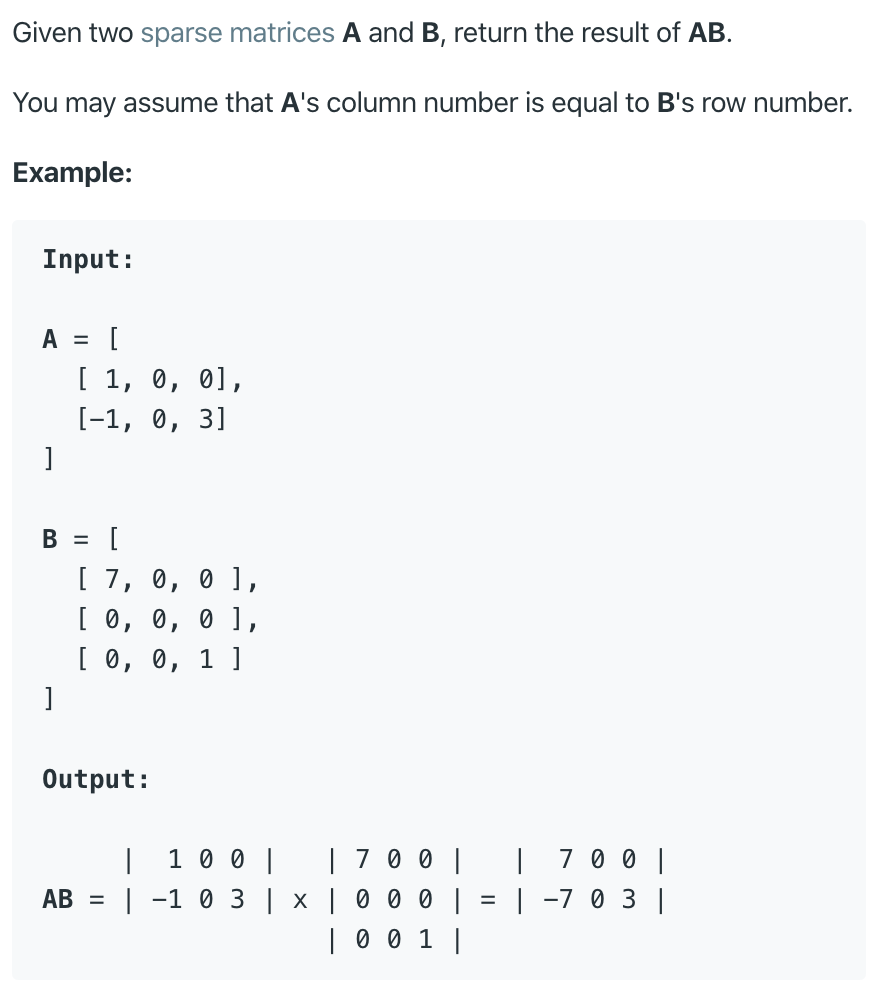Sparse Matrix Multiplication

# Solution
If A is n m, B is m t, then C is n t. If we calculate sparse matrix multiplication as normal matrix, time complexity is .
The best time we could get is , assuming number of nonzeros on each row/col of sparse matrices A and B is constant.
# Brute Force 1
Utilize the following formula to calculate each element of C:
C[i][t] += A[i][j] * B[j][t]
def multiply(self, A: List[List[int]], B: List[List[int]]) -> List[List[int]]:
n = len(A)
m = len(A[0])
t = len(B[0])
C = [[0 for _ in range(t)] for _ in range(n)]
for i in range(n):
for k in range(t):
vector_sum = 0
for j in range(m):
vector_sum += A[i][j]*B[j][k]
C[i][k] = vector_sum
return C
2
3
4
5
6
7
8
9
10
11
12
13
# Brute Force 2
Could exchange the order to loop over m and t, so C is not calculated by each element, but increasingly.
def multiply(self, A: List[List[int]], B: List[List[int]]) -> List[List[int]]:
n = len(A)
m = len(A[0])
t = len(B[0])
C = [[0 for _ in range(t)] for _ in range(n)]
for i in range(n):
for j in range(m):
for k in range(t):
C[i][k] += A[i][j]*B[j][k]
return C
2
3
4
5
6
7
8
9
10
11
# Improve on A
Based on bruce force 2, could improve time complexity(practical, not asymptotic) if A[i][j] is 0.
def multiply(self, A: List[List[int]], B: List[List[int]]) -> List[List[int]]:
n = len(A)
m = len(A[0])
t = len(B[0])
C = [[0 for _ in range(t)] for _ in range(n)]
for i in range(n):
for j in range(m):
if A[i][j] != 0:
for k in range(t):
C[i][k] += A[i][j]*B[j][k]
return C
2
3
4
5
6
7
8
9
10
11
12
# List Comprehension & Two Pointers
Use Python's list comprehension feature to record the indices and nonzero values, then multi calculates vector product only if two pointers idx1 and idx2 have the same value.
Time and space complexities are both squared.
def multiply(self, A: List[List[int]], B: List[List[int]]) -> List[List[int]]:
m = len(A)
n = len(A[0])
t = len(B[0])
row_vector = [
[
(j,A[i][j])
for j in range(n)
if A[i][j]!=0
]
for i in range(m)
]
col_vector = [
[
(j,B[j][k])
for j in range(n)
if B[j][k]!=0
]
for k in range(t)
]
C = [
[
self.multi(row,col)
for col in col_vector
]
for row in row_vector
]
return C
# returns value for C[i][j]
def multi(self, row, col):
i = 0
j = 0
res = 0
while i < len(row) and j < len(col):
idx1, val1 = row[i]
idx2, val2 = col[j]
if idx1 < idx2:
i += 1
elif idx2 < idx1:
j += 1
else:
res += val1 * val2
i += 1
j += 1
return res
2
3
4
5
6
7
8
9
10
11
12
13
14
15
16
17
18
19
20
21
22
23
24
25
26
27
28
29
30
31
32
33
34
35
36
37
38
39
40
41
42
43
44
45
46
47
48
49
50
# HashMap (REDO)
We can also use a hashmap instead of list to store the mappings from indices to nonzero values.
The time and space complexities are also both squared.
def multiply(self, A: List[List[int]], B: List[List[int]]) -> List[List[int]]:
if A is None or B is None: return None
m, n = len(A), len(A[0])
if len(B) != n:
raise Exception("A's column number must be equal to B's row number.")
l = len(B[0])
table_A, table_B = {}, {}
for i, row in enumerate(A):
for j, elt in enumerate(row):
if elt:
if i not in table_A: table_A[i] = {}
table_A[i][j] = elt
for i, row in enumerate(B):
for j, elt in enumerate(row):
if elt:
if i not in table_B: table_B[i] = {}
table_B[i][j] = elt
C = [[0 for j in range(l)] for i in range(m)]
for i in table_A:
for k in table_A[i]:
if k not in table_B: continue
for j in table_B[k]:
C[i][j] += table_A[i][k] * table_B[k][j]
return C
2
3
4
5
6
7
8
9
10
11
12
13
14
15
16
17
18
19
20
21
22
23
24
# Follow Up
There are 2 sparse vectors w/ same dimension. Assume the number of non-zero eltments is n, how do you calculate the vector product in time?
The secret to do this lies in preprocessing the input. We can record the (index, value) pairs like this:
A = [0,0,1][2, 1]B = [3,0,0][0, 3]
We can then do multi as in solution list comprehension & two pointers